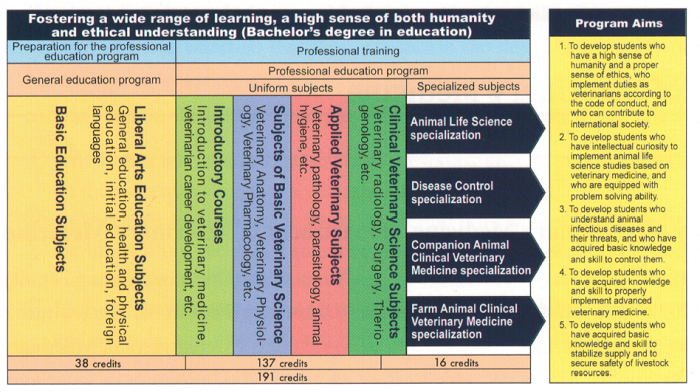

The primary distinguishing characteristic of an education recieved from the Joint Faculty of Veterinary Medicine is the fact that students at both universities take the same educational courses under the same syllabus and schedule. By offering most courses - not only specialized courses, but also some general courses - on a shared basis, both universities' faculty members are able to provide a highly specialized education that draws on their distinctive qualities.
Lectures and practical study sessions utilize real-time, bidirectional remote instruction that is offered through the Science Information NETwork 4* academic information networ using video and audio input/output systems that have been installed at both universities. Faculty members and students also travel between the two campuses to participate in lectures and practical study session.
* Science Information NETwork 4 is an information communications network bult and operated by the National Institute of Informatics as a foundation for the exchange of academic information among universities, research institutions, and other facilities throughout Japan.

In the Joint Faculty of Veterinary Medicine, first year students take general courses and basic courses and review their knowledge in the areas of biology, chemistry, molecular biology, and statistics, which form the foundation of veterinary medicine. THey also develop an understanding of bioethics with regard to animals used in experiments and practical study while polishing the communication skills, language skills, and information utilization skills that will allow them to express themselves effectively. Additionally, they take introductory courses to develop an overall vision of veterinary medicine education and an understanding of the social role of veterinarians through Introduction to Veterinary Medicine and similar courses.
Second - through fifth-year students take uniform courses, which comprise the core of their specialized education, to master the knowledge and skills they will need as veterinarians. Uniform courses consist of basic veterinary courses, which address the structure and function of animals; applied veterinary courses, which address basic pathogens and pathology as well as the diagnosis and prevention of animal diseases; and clinical veterinary courses, which address the diagnosis and treatment of animal diseases. Participation-based practical study sessions offered as part of clinical veterinary courses provide students guidance in the practice of medical care through animal cases at facilities both on and off campus.
Fourth - through six-year students take more evolved specialized courses. Students select from the Animal Life Science, Disease Control, Companion Animal Clinical Veterinary Medicine, and Farm Animal Clinical Veterinary Medicine specializations. In each of those courses, students attend major seminars addressing topics appropriate to their specialization, write a graduation thesis, attend special lectures, and conduct special laboratory work.
